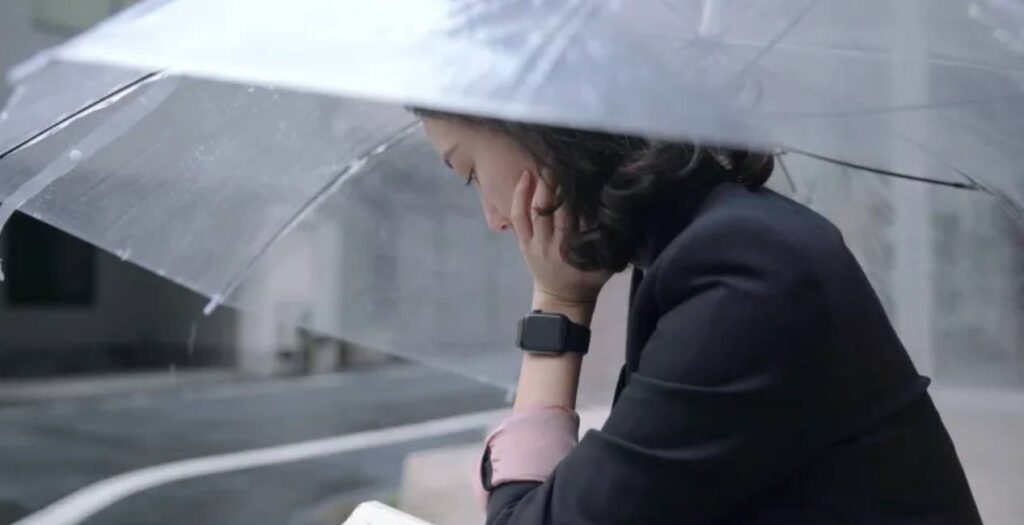Black Box Diaries and this review discuss sexual assault.
The documentary format of storytelling allows filmmakers the ability to capture life as it is. However, this is at its most powerful when the filmmaker is turning the camera inward on themselves. In Black Box Diaries, journalist Shiori Ito brings audiences into her courageous investigation of her own sexual assault. When the authorities refuse to prosecute her high-profile offender or pursue her case in a meaningful way, Ito pushes back against the system trying to bury her case.
Ito’s rape happened in 2015. An intern at the time, Ito went out for a drink with TV reporter Noriyuki Yamaguchi. However, when she became intoxicated, Yamaguchi took her to a hotel room against her will. It’s a moment that Ito shows the audience early on, using CCTV footage and silence to let the weight of the situation sink in. It’s gutting to watch, like a scream caught in your throat.
She is dismissed when she tries to report the rape to her family and the authorities. For her family, the stigma of being “the victim” is too much to bear, and they suggest she stay quiet. The police used a misogynistic Japanese law that did not define sexual assault as non-consent to silence her case. Ito breaks down the ways in which Japanese society always chooses to defend men’s honor, whether that be socially or legally.
Instead of acquiescing and accepting the injustice, her quest becomes a landmark case in Japan that exposes the country’s outdated judicial and societal systems. The weight of this endeavor is always clear. From the moment the film begins until the moment it ends, Ito is fighting Goliath, and that weight never leaves.
This isn’t the first time that Shiori Ito has shared her story. In 2017, she published a book titled Black Box, where she shared her story. However, the purpose of that book and this documentary aren’t just to get justice for herself. Rather, Ito is telling her story to bring sweeping change in government to make the future better for the next intern on a company outing.
Ito’s journalistic background is on display in how she constructs the documentary. While Ito brings the audience into her very personal journey, she also takes the time to lay every card on the table. She reconstructs timelines and presents videos and conversations that pull her experience into perspective. However, the painstaking process of recounting her assault and the struggle to be believed after is never done to convince the viewer. Instead, she presents her experience as an account of life. Through her carefully laid out experience, we see how the Japanese judicial system fails women. Her family is worried about her stigmatization and what it means for people to know that she is a victim. Because of that, we see how they fail her. Ultimately, we understand everything she has and still is risking to help others.
The documentary is, at one time, a personal journal and a historical account of her trauma. Merging the two with a deft hand, Ito has crafted something powerful and gripping for anyone who has experienced or known someone who has experienced sexual assault. Her story is not unlike many others. The failings of the Japanese authorities are also recognizable in other police institutions that lose rape kits, convince survivors not to pursue charges because they “don’t have enough,” and otherwise discard the trauma they do not see as valid.

But Shiori Ito’s story isn’t devoid of joy. By relying on personal videos taken with friends who form her support system, Ito also presents the audience with moments of happiness. Rays of light shine through the turmoil as she takes on the world. It’s necessary to understand that surviving isn’t just being alone.
Black Box Diaries captures the power of film as a medium. For Shiori Ito, film is a way to process trauma. To grieve who she was before her assault. And ultimately, a tool to seek justice that has been denied. By utilizing videos shot on her phone, press spots, recorded phone conversations, and CCTV footage, Ito recounts her sexual assault and the events that follow. Her struggle to come to terms with it and, ultimately, her journey in seeking justice.
Ito doesn’t over-editorialize her story. She presents it in its rawest form, detailing her life. Instead of using dialogue throughout, there are some scenes left to speak for themselves. There are moments in Ito’s personal videos where it is just her and the phone—and now the audience, where you can feel her emotions cracking. But her pursuit of justice speaks for itself. Ito presents conversations mostly without commentary, making an even heavier atmosphere for the film.
As a survivor, Ito doesn’t hold back her lowest lows from the audience. She is resilient, but she is not unwavering in resolve. It is hard to keep fighting, and Ito shares the moments in which she wants to give up, showing the crushing reality of fighting. Allowing the audience to see her at her most vulnerable keeps Black Box Diaries from feeling like a curated anthem and like a personal ballad written in a notebook for the hardest of times.
Black Box Diaries is a painful watch as someone who has experienced interpersonal violence and tried to seek justice. Shiori Ito’s resiliency and courage to tell her story through film and through her eyes can’t be understated. Perhaps, though, it’s the strength others will find in her story and in seeing it displayed in its rawest form that will capture the film’s true beauty. We are not our trauma, and we owe it to ourselves to find our way through it however we can.
For Ito, it was laying herself bare to the world in Black Box Diaries. For others, it may be simply admitting it happened. Black Box Diaries gives space for both. Powerful, somber, and with just the right amount of hope, Black Box Diaries is one of the most stunning uses of documentary filmmaking as a storytelling mechanism I have ever seen.
Black Box Diaries screened as a part of Sundance 2024.
Black Box Diaries
-
Rating - 10/1010/10
TL;DR
Powerful, somber, and with just the right amount of hope, Black Box Diaries is one of the most stunning uses of documentary filmmaking as a storytelling mechanism I have ever seen.







